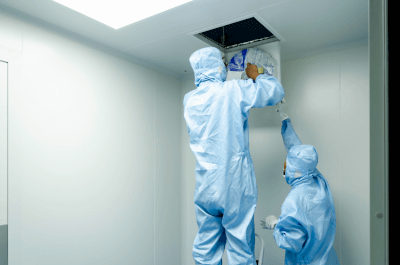What Is a Chemical Filter?

A chemical filter is a specialized device used to eliminate toxic gases and minute acidic and basic particles from the air or fluids. These filters are primarily employed in the treatment of liquid and gaseous substances and are proficient in removing molecular contaminants present in the air. Chemical filters are widely utilized in the manufacturing of precision equipment and medical applications. Due to the diverse range of harmful substances that need to be removed, chemical filters are often designed with combinations of different filter media.
It’s important to note that chemical filters have a limited lifespan and must be replaced periodically. This replacement incurs costs for filter media and waste disposal.
Uses of Chemical Filters
Chemical filters find applications in various fields, and here are some examples of their uses:
1. Semiconductor Device Manufacturing and Processing: Chemical filters are crucial in the semiconductor manufacturing process to prevent device malfunctions caused by minute particles and to eliminate acidic or basic gases that can lead to insulation defects.
2. Protection of Cultural Assets: These filters are used in art galleries and museums to safeguard valuable cultural artifacts from the effects of harmful gases present in the air.
3. Medical Institutions: Chemical filters play a role in sterilizing medical equipment and maintaining sterile environments in medical facilities.
Principle of Chemical Filters
Chemical filters utilize various adsorbents and resins to remove specific toxic substances. Common types of chemical filters include:
1. Ion Exchange Resin: These filters are used to eliminate acidic and basic toxic substances. They operate by exchanging harmful ions with harmless ions through ionic reactions. Acidic substances (containing hydrogen ions) and basic substances (containing hydroxide ions) are exchanged for water or carbon dioxide, which are safe byproducts.
2. Activated Carbon: Activated carbon filters have microscopic pores through which gases pass, enabling them to adsorb a wide range of harmful substances.
3. Giga Soap: Giga Soap is a combination of polyurethane with numerous pores and microscopic spherical activated carbon. It offers highly efficient removal and minimal pressure loss due to excellent air permeability.
How to Select a Chemical Filter
When choosing a chemical filter, it’s essential to consider the Space Velocity (SV) value, which represents the amount of airflow passing through the filter with adsorbent per hour. The SV value is calculated as:
SV value (1/h) = airflow rate (m³/h) ÷ adsorbent fill volume (m³)
A lower SV value indicates that a smaller amount of air passes through the filter per hour, which is beneficial for collecting airborne hazardous substances efficiently. Smaller SV values also extend the lifespan of the adsorbent. Hence, selecting a chemical filter with a lower SV value is advantageous for applications requiring high-efficiency removal of harmful substances.
Lifetime of Chemical Filters
Chemical filters have a finite lifespan, and as they approach the end of their service life, their ability to adsorb hazardous substances diminishes. Manufacturers typically specify the standard lifespan of a chemical filter, but the actual lifespan can vary depending on environmental factors. These factors include temperature, humidity, the concentration and composition of hazardous substances in the environment, and the number of hours the filter is in use daily. Performing service life tests that consider these factors can help calculate the expected service life of a filter.
In some installations, multiple chemical filters are used in series, allowing other filters to continue removing hazardous substances even when one filter reaches the end of its service life.